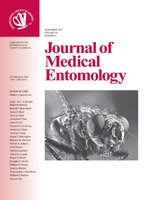A previously validated, spatially explicit, agent-based model of arbovirus transmission among vector mosquitoes and avian hosts is used to explore the effectiveness of different insecticide control strategies for reducing rates of epizootic transmission and mosquito infection. Mosquito control within the model reduces infection rates among hosts and vectors but generally lengthens the transmission season. Insecticide application focused at oviposition sites is found to be as effective as control applied over the entire model landscape. The findings also indicate that optimum use of insecticide resources would first target areas in which bird activity is collocated with vector mosquito breeding sites, and then, if resources permit and mosquito mortality due to the insecticide is high, target other vector mosquito breeding habitats. More broadly, these experiments demonstrate that model systems provide an economical framework for testing different mosquito and mosquito-borne pathogen control strategies and can ultimately inform field interventions and enable better allocation of intervention resources.
How to translate text using browser tools
1 November 2011
Strategies for Controlling the Epizootic Amplification of Arboviruses
Jeffrey Shaman
ACCESS THE FULL ARTICLE
It is not available for individual sale.
This article is only available to subscribers.
It is not available for individual sale.
It is not available for individual sale.

Journal of Medical Entomology
Vol. 48 • No. 6
November 2011
Vol. 48 • No. 6
November 2011
Agent-based model
arbovirus
insecticide
mosquito
zoonosis




